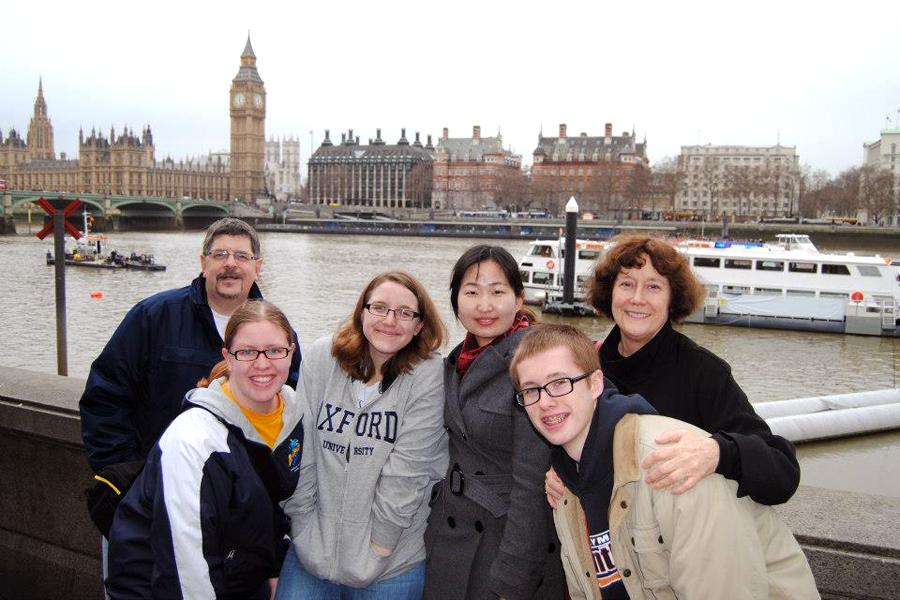The ENG 123 London Theater Trip was the highlight of the holiday season for a group of nine Lakeland students led by Dr. Linda Tolman, professor of English, and Charlie Krebs, associate professor of theatre and speech. Alumni and significant others also came along as they traveled to Stratford-Upon-Avon, Bath, Stonehenge, Oxford, and London.
The group of fifteen total left Chicago for England the day after Christmas and returned on Jan. 5 with five more theatrical productions under their belts, in addition to a number of sights and sounds from another land and—in some cases—from another time.
Krebs described the trip as “a doable cultural immersion” because of the way the trip was designed to “take [students] outside of their comfort zones” without becoming too overwhelming.
Tolman, the main leader for the trip, said that she wanted “people to get a sense of confidence in their abilities to travel on their own,” so the trip was designed to have extra time during the day for students to see the sights on their own or in small groups, later coming together to see evening theatre productions.
“There was a balance between structured things and free time for what they wanted to do,” said Tolman.
The structured items on the agenda included the mandatory plays and musicals, a visit to Westminster Abbey for Evensong (an evening service), a ride on the London Eye, and group dinners at some of Tolman’s favorite local restaurants.
Regarding the theatrical productions that the students attended and analyzed for their studies, Tolman—assisted by Krebs, who is learning the ropes for future trips—selected for the trip only the productions with the highest ratings from critical reviewers. All the plays and musicals that the group saw together had been awarded either four or five stars.
The group began their journey with several days in Stratford-Upon-Avon, a place that seemed almost frozen in time since William Shakespeare’s birth there in 1564. The Lakeland travelers toured the town and the various landmarks made significant by the famous playwright, such as Anne Hathaway’s (wife of Shakespeare) cottage and Holy Trinity Church, where Shakespeare was buried.
“When I stood in the room where Shakespeare was born, I was almost in tears,” said Krebs, “[because they were the] same four walls where he wrote some of the things that meant so much to me. To walk some of the streets he walked down was beyond words.”
Each day a different student presented findings to the group related to a specific relevant, cultural or historical topic. These reports continued on a nearly daily basis throughout the trip and included information on Warwick Castle, Buckingham Palace, and Royal Albert Hall.
“It was cool to see students experience a new culture, from theatre to food to what side of the street they drive on,” said Krebs.
In Stratford the group got their first tastes of British theatre with Boris Godunov and The Orphan of Zhao at the Swan Theatre.
The group was literally dodging the actors’ spit as they sat in the front rows at both productions, a “once in a lifetime opportunity,” which Tolman says was made possible due to her associate membership with the Royal Shakespeare Company.
The Lakelanders traveled from Stratford by bus to see the ancient Roman Baths and Stonehenge.
Later, the group spent New Year’s Eve in Oxford, where they were encouraged to inspect the city’s intricate, old architecture during the rainy days spent there. The hotel they stayed at provided its guests with a complimentary tour around the city, allowing the students to learn the history behind all the nearby structures.
Tolman explained that although she has led theatre trips to London before, about “two-thirds of what we did was new,” noting that stopping at Oxford was a good addition because it provided “another dimension of the rich cultural and historical atmosphere.”
Then it was off to London, where one of their first sights of the famous city was Big Ben, the huge clock tower.
“I enjoyed seeing Big Ben as we came out of the Underground station,” said Lindsay Kleckner, sophomore criminal justice major. “The fact that it was staring me right in the face was hard to believe.”
Krebs said that what he wanted students to take away from the trip was “the cultural component. [I wanted them to] be immersed in it—money, food, customs, some of the unusual language things they say. [It is] healthy to experience all this with the luxury of a common language.”
During the day the group was allowed to split up and view a Krebs said that what he wanted students to take away from the trip was “the cultural component. [I wanted them to] be immersed in it—money, food, customs, some of the unusual language things they say. [It is] healthy to experience all this with the luxury of a common language.”
During the day the group was allowed to split up and view a multitude of landmarks and famous sights, but came together in the evenings to see shows like War Horse, The Lion King the musical, and Matilda the musical.
“I absolutely loved The Lion King,” said Kleckner. “It was just a real work of art with all the costumes and sets.”
Students enrolled in ENG 123 were required to write a brief report on each show they saw on the trip, allowing Krebs and Tolman to use the reports as conversation starters for group discussions of the productions.
Tolman hopes the students learned through their analyses that “theatre is a joined enterprise between the spectator and the performer.”
Tolman says that the next international trip she is planning for the Lakeland community will be a trip to Greece in 2015. That trip will focus on art, literature, and sports, but it will be open to all students just as this year’s theatre trip was.


